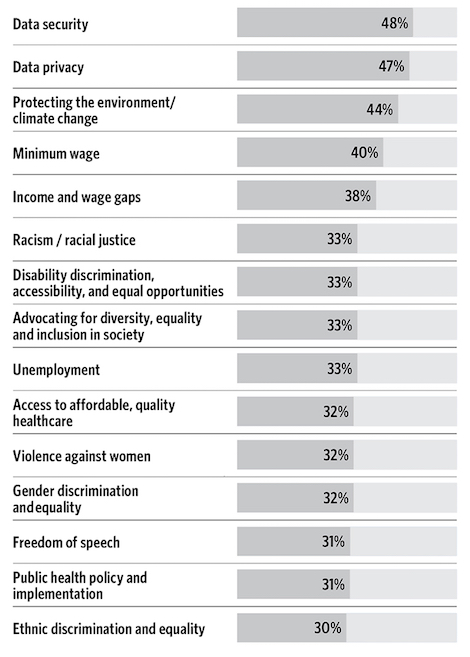Data privacy and security are the top issues consumers care about and are now the top challenges most expect companies to act on, according to a new study by FleishmanHillard.
FleishmanHillard's biennial study, which seeks to measure the gap between consumer expectations and their actual experiences with companies and brands, analyzed insights from respondents in six countries and their experiences with more than 300 companies across 20 industries in an effort to uncover what role consumers around the world believe companies should take in addressing today’s top societal, political and business challenges.
According to the study, a majority of consumers globally said that data privacy (55 percent) and data security (57 percent) are now the top issues that are most important to them.
More than half of consumers (56 percent) admitted that privacy concerns have made them less likely to use products or services from companies that use consumer data for their own benefit. As a result, only 45 percent said they’re now willing to let companies collect their personal information, even when it means providing them with greater convenience and personalization. More than two-thirds (68 percent) also think companies must demonstrate that they’ve made meaningful data and consumer protection practices that go beyond mandated regulations.
 |
| Top issues that consumers expect companies to act on. |
Following data privacy and security, other top issues of consumer concern include access to affordable, quality healthcare (54 percent), violence against women and access to affordable, quality education (both 50 percent), freedom of speech (48 percent) and protecting the environment and climate change (47 percent).
When it comes to the issues on which consumers most want companies to take action, data security and privacy again topped the list (47 and 48 percent, respectively), followed by protecting the environment and climate change (44 percent), minimum wage (40 percent), income and wage gaps (38 percent) and racism and racial justice issues (33 percent).
The study undergirds the relatively newfound concept that how a brand engages with society is often viewed as more important than the customer benefits its products or services offer. In fact, fewer than half (47 percent) of respondents said their perceptions and beliefs about a company are shaped by attributes solely related to the products or services a company provides. A third (32 percent) said those perceptions are instead shaped by a company’s impact on society, and nearly a quarter (21 percent) said those perceptions come from the ways in which a company’s management behaves. In fact, the FleishmanHillard study discovered that two-thirds of consumers (66 percent) believe that for a company to be more credible than its competitors, it must talk about its behaviors and impact on society as well as the environment.
In the eyes of the public, it appears a large part of this responsibility rests on the shoulders of company leaders. Two-thirds of those polled (65 percent) believe CEOs should speak up on issues that “may not have a significant impact on the business but have a significant impact on society.” Nearly three-quarters (73 percent) said CEOs should have an active voice on supporting and influencing environmental policy change, and 65 percent believe CEOs should play a role influencing health policy. An additional 72 percent believe CEOs should demonstrate their commitment to diversity, equity and inclusion efforts, both internally and externally.
FleishmanHillard’s latest “Authenticity Gap” study surveyed more than 10,200 adults in Brazil, China, Germany, UK and the U.S. between March and April. The survey was conducted by FH’s intelligence unit, TRUE Global Intelligence.


 Ruder Finn has recruited Ketchum veterans Corrine Gudovic and Tera Miller to bolster its consumer group, which serves Coca-Cola, Disney, LG, and Aveda.
Ruder Finn has recruited Ketchum veterans Corrine Gudovic and Tera Miller to bolster its consumer group, which serves Coca-Cola, Disney, LG, and Aveda. Successful consumer PR campaigns go beyond promotion. They craft a gripping brand narrative, showcasing a product's values, mission, and dedication to social responsibility.
Successful consumer PR campaigns go beyond promotion. They craft a gripping brand narrative, showcasing a product's values, mission, and dedication to social responsibility.
 Coyne PR has scooped up AOR duties for Edible Brands, which offers fresh fruit arrangements, baked goods, flowers and gourmet chocolates at more than 1,000 locations.
Coyne PR has scooped up AOR duties for Edible Brands, which offers fresh fruit arrangements, baked goods, flowers and gourmet chocolates at more than 1,000 locations. BNPL, fueled by online shopping, grew by more than 1000 percent from 2019 to 2021. It has become a force that is transforming retail, e-commerce, and how consumers shop in general.
BNPL, fueled by online shopping, grew by more than 1000 percent from 2019 to 2021. It has become a force that is transforming retail, e-commerce, and how consumers shop in general.


 Have a comment? Send it to
Have a comment? Send it to 
No comments have been submitted for this story yet.